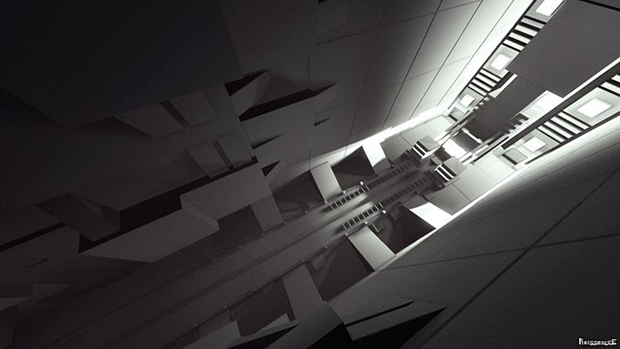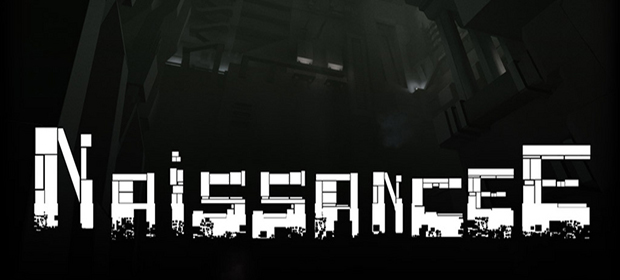The overbearing feeling of loneliness is something we’ve all felt while lost. With no one to ask for guidance, we attempt to find our way in a reality that is different to our own. NaissanceE begins with a simple narrative, “Lucy is lost”. As Lucy, it’s implied that you must escape this world that you are not familiar with, and seek some answers.
That unfamiliarity is a joy at the start, yet descends into something that becomes maddening from time to time. NaissanceE tells you little to nothing. Every so often, when a new mechanic is introduced, an on-screen prompt will appear, giving you a slight insight into what’s required to progress. This minimalistic approach is seen throughout the game as exploration is certainly encouraged – even if the answer is normally of a linear nature. In the earlier, more compact environments, the sense of discovery and uncertainty is a real delight. Venturing into the unknown, not too sure if the path you are on is indeed the correct one, is liberating. But as the story unfolds and the areas become more vast, you’ll find yourself ambling across certain sections, running into walls – both figuratively and literally.

The world itself, even with its annoyances, is really beautiful. Sharp and rigid in nature, NaissanceE is built on the stark contrast of black and white. Through the use of glowing orbs that become your guide, and also beams of light that periodically shine across the landscape, you traverse across the blocky terrain, leaping, crouching and running where necessary. The use of light, in particular, is stunning. Shadowy outlines of tall structures are littered around your person and you must decide which one will be the key to reaching your desired location.
Sadly, developer LimasseFive neglect the wonderful sense of delving into uncharted territory for a more traditional platforming element that becomes more and more prevalent as NaissanceE goes on. It’s such a shame too, because exploring your surroundings at the beginning creates such an eerie atmosphere that isn’t replicated once you’re required to run-and-jump-and-breath. There are very, very few instances of first-person platforming that are satisfying and this effort becomes just another statistic, too. In addition, breathing isn’t something that the protagonist does automatically.
Innovative mechanics are almost always encouraged, however this one falters due to the poor platforming. While running, a small circle will appear on-screen, which signals that Lucy is in need of air. By clicking the left mouse button, you inhale – but breaths must be rhythmic so you can maintain your velocity. At first glance, this idea seems like an interesting introduction, but trying to balance running, breathing and jumping over a series of gaps is infuriatingly awkward and leads to multiple falls. Sometimes these drops see you having to retreat a few steps in order to begin your hop, skip and jump trial again, but larger tumbles will result in death and will expose the poor checkpointing system.
With no option to save your game where you desire, you are put at the mercy of NaissanceE’s inconsistent checkpoints. There were a number of occasions where I was forced to go over old ground for approximately ten minutes because I didn’t judge a platform’s distance correctly. NaissanceE is hypnotic and one can easily find themselves in a trance when in the middle of a puzzle, yet repeating said puzzle is an irritation that doesn’t need to be present.

As well as the pretty backdrop, one reason that NaissanceE is so immersive is the sound design. From the beating of footsteps to the panicked inhalation of the lead character (even though the mechanic itself doesn’t quite work), the audio is superb. Throwing yourself into a previously uncovered area is definitely a bit unsettling and the soundtrack is another reason why. From the creepy bellow of an organ to the subtle ambience of things around you, the music plays a massive part in creating an air of doubt.
VERDICT: When taking in the world around you, NaissanceE is a thing of beauty. The scenery is so bare bones that it walks a fine line between being soothing and unnerving in one fell swoop. It starts with such a care and precision, but quickly becomes less memorable once you are asked to be more precise in your own movements. A lot of that comes down to an to an innovative yet flawed respiratory design choice. With exploration touted as a hook, the disorientating nature of later sections is also frustrating, especially after a measured opening. Lucy is indeed lost, as are a number of features in NaissanceE.

DECENT. A 6/10 indicates that, while this game could be much better, it still has a fair amount to offer the player. It might be an interesting title sabotaged by its own ambition, or a game denied greater praise by some questionable design choices. Don’t avoid it outright, but approach it with caution.
Review code provided by the publisher.






